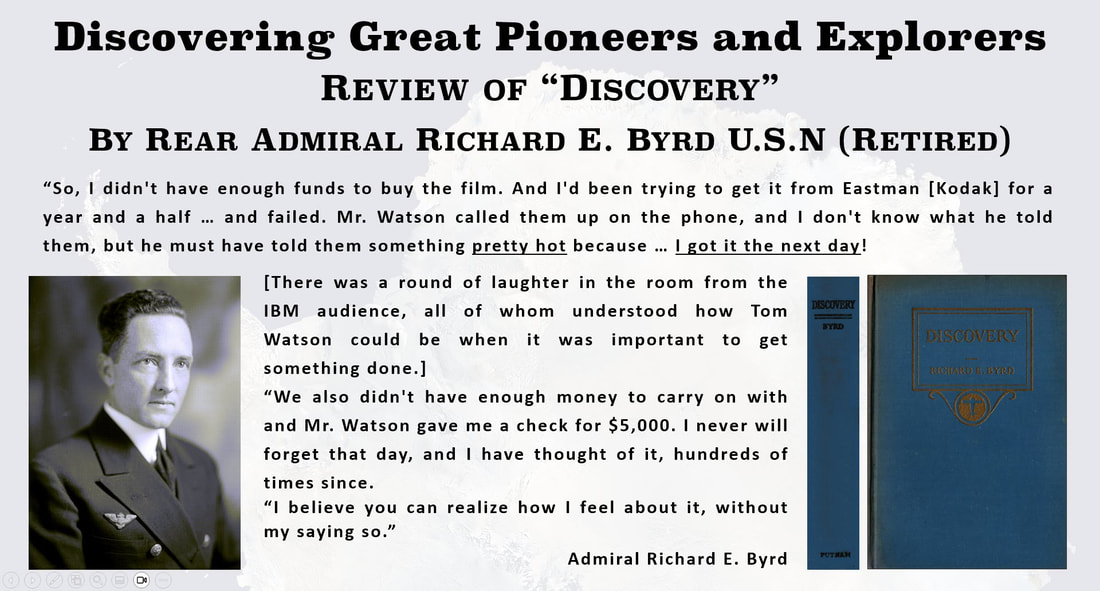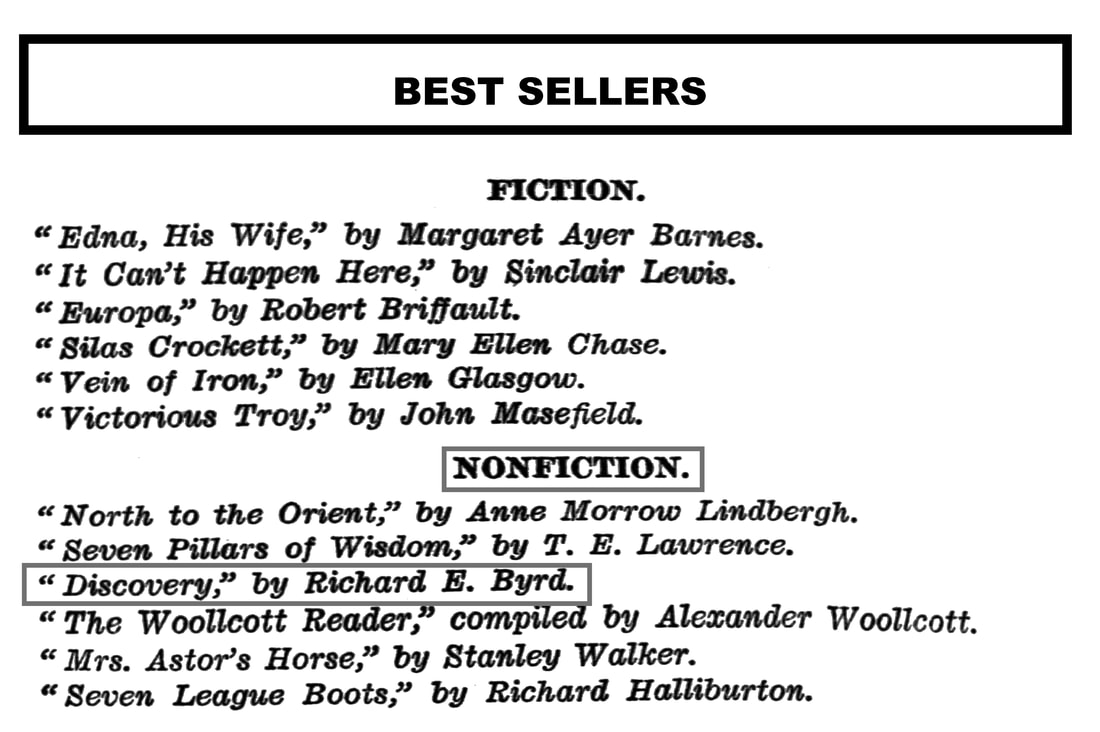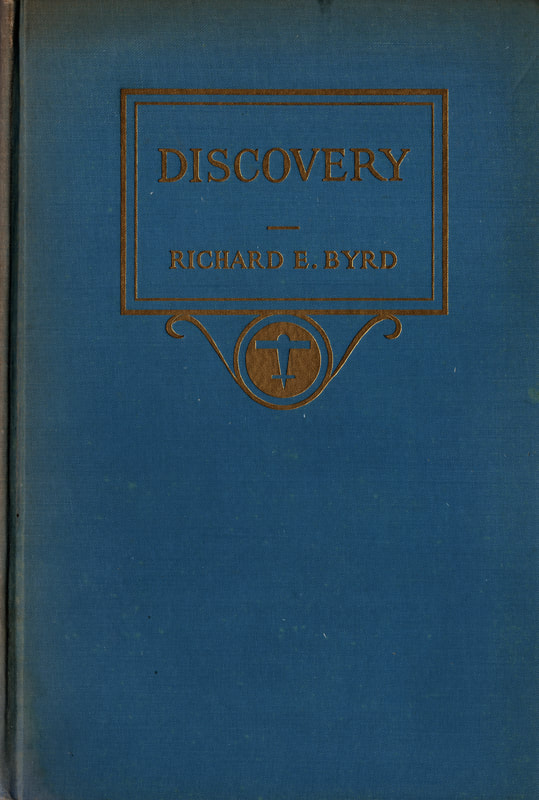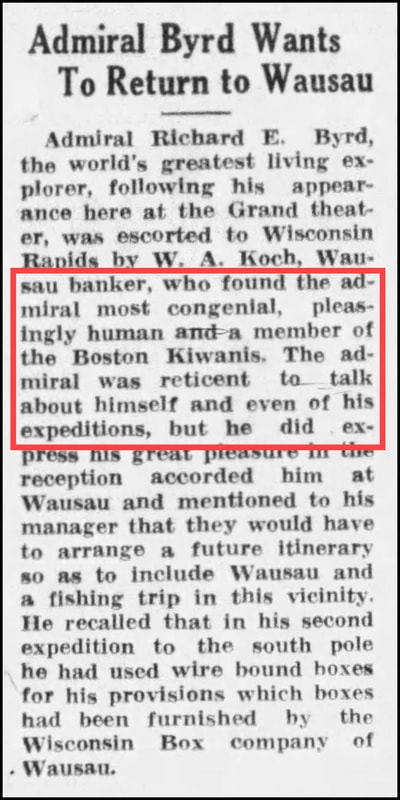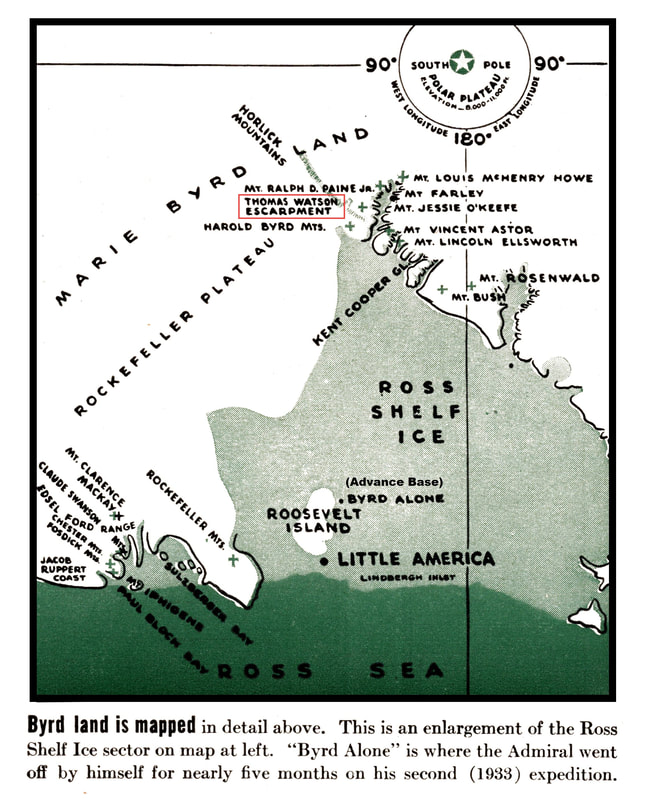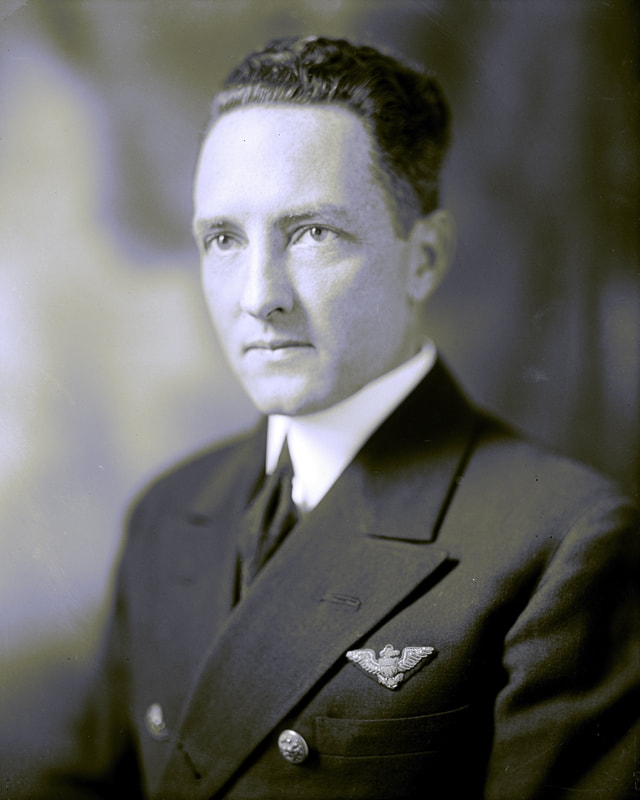A Review of "Discovery" by Admiral Richard E. Byrd
|
|
Date Published: September 24, 2023
Date Modified: September 30, 2023 |
“This thrilling, tremendously moving, and inspiring story of man’s daring, courage, fortitude, and self-abnegation [the denial of one’s own interests in favor of the interests of others] restores one’s faith in the human race that can produce such a man … and such men. There are enough thrills to supply a dozen novelists, yet it is told with such quiet dignity, such modesty and moderation as to amount to understatement. …
“How this tremendous expedition completed its work and returned without losing a man seems almost unbelievable. … Secretary of the Navy, Swanson, in his introduction tells of … the man, Byrd—the navy officer and explorer, and of his genius for leadership which gives the key to the mystery.”
“How this tremendous expedition completed its work and returned without losing a man seems almost unbelievable. … Secretary of the Navy, Swanson, in his introduction tells of … the man, Byrd—the navy officer and explorer, and of his genius for leadership which gives the key to the mystery.”
M.S.D., “Byrd’s Magnificent Odyssey of Antarctica,” The Nashville Banner, 1935
A Review of “Discovery” by Richard E. Byrd
- Reviews of the Day: 1935–36
- Selected Insights from “Discovery”
- This Author’s Thoughts and Perceptions
Reviews of the Day: 1935–36
The success of this book is found in two measurements of success for such works: One publication noted that 40,000 copies of the book were pre-ordered, and it quickly found its way into the top tier of the year’s nonfiction bestseller list. Also, the reviews were plentiful and extremely praiseworthy of the work.
For your consideration, here are a select few reviews from the many that were written over a few months in late 1935 and early 1936.
For your consideration, here are a select few reviews from the many that were written over a few months in late 1935 and early 1936.
|
“Byrd gives less attention to the dramatic incidents described in ‘Little America’ [Byrd’s first book about his first trip to Antarctica].” … ‘Discovery’ leaves me with a great respect for Admiral Byrd’s purpose and achievement, even though, as a layman, I am more impressed by the dangers surmounted than by the weather data gathered in the polar atmosphere. …
“The most gripping pages deal with the cold, dark winter when fifty-five men dug in at Little America and Admiral Byrd lived alone in the advance weather base. … The story of how the expedition saved its airplanes and trucks against nature’s determined fight to crush them all is heroic.” |
"Discovery" was an immediate best seller.
|
Harry Hansen, “Admiral Richard E. Byrd Pens Absorbing Account,” The Pittsburgh Press, December 1935
“There are certain incidents and pictures which stand out in your mind after reading ‘Discovery.’ … The rivalry between dog teams, pushing forward into new territory, sometimes heavily plodding in soft snow or facing such wintry blasts that the dogs froze to death as they pulled; and the tractors with their great power and greater helplessness as oil and gasoline froze solid, or the snow crumpled away and death in the form of deep cracks, fissures, valleys, suddenly yawned open under the laboring tractors. …
“We have another fascinating chapter in that age old struggle of man seeking his Northwest passage, his Southwest passage, his conquest of the North and South Pole—battlegrounds which have seen the courage and endurance of man flame to its greatest height.”
“We have another fascinating chapter in that age old struggle of man seeking his Northwest passage, his Southwest passage, his conquest of the North and South Pole—battlegrounds which have seen the courage and endurance of man flame to its greatest height.”
Harold A. Wooster, “Interesting Books,” The Scranton Republican, 1935
“You will find ‘Discovery’ highly enlightening—and durned interesting, to boot. … The expedition was on the very verge of utter disaster at one time, with the ice threatening to move out from under its camp; and a tractor can be a headache when you have to use a blow torch to thaw out the transmission grease before you can start it. …
“All in all, Admiral Byrd has written a valuable and fascinating book.”
“All in all, Admiral Byrd has written a valuable and fascinating book.”
Books of the Day, “Admiral Byrd Tells Why He Went,” The Victoria Daily Times, 1936
Selected Insights from "Discovery"
- Admiral Byrd on the Personal Risks of Exploration … beyond the Physical
|
“I have not been unaware of the dangers I have been risking on these expeditions other than those of a physical nature. Personal bankruptcy could easily follow an untoward accident such as the sinking of one of the ships in the ice or in a bad storm, and my reputation as a leader would also be involved.
“Other expeditions that have approached the size of mine generally had the government back of them to shoulder the responsibility. … I have borne the responsibility and debts of the expeditions I have lead. It hasn’t always been the gentlest of occupations. … It involves an exhausting period of preparation and begging, a heavy field campaign, and on top of that a dreary struggle to pay off accumulated debts, piling up like the layers of a cake.” It is important to note that Tom Watson arrived on the scene at a time when Admiral Byrd was at one of his lowest points in attempting to outfit his expedition and cover its growing debts.
Here is what Admiral Byrd told an IBM audience after he returned from Antarctica: |
"Discovery" is Admiral Byrd’s account of his second Antarctica expedition.
|
"I never will forget the day, not long before we left, that I called on Mr. Watson. It was the lowest day I had had. I was in a tough fix gathering material for the expedition. And I told him my troubles. You know it's difficult getting an expedition like this together—fifteen thousand different items. I was having troubles.
"Well, he was the first man I had called on who really saw what we were trying to do for science. He saw it immediately. I told Mr. Watson, among other things, that I’d been trying to get some film … a good many thousand dollars’ worth, that I had to have for my mapping … mapping is inherently one the most important things we do. Mapping the country as we explore new areas. … It is certainly interesting to us to see a great mountain in the distance that no human eye ever looked upon before, and get a map of that area at the same time you discover it.
“So I didn't have enough funds to buy the film. And I'd been trying to get it from Eastman [Kodak] for a year and a half … and failed. Mr. Watson called them up on the phone, and I don't know what he told them, but he must have told them something pretty hot because … I got it the next day. … [there was a round of laughter from the IBM audience, all of which understood how Tom Watson could be when it was important to get something done].
“We also didn't have enough money to carry on with and he gave me a check for $5,000.
“I never will forget that day, and I have thought of it, hundreds of times since.
“I believe you can realize how I feel about it, without my saying so.”
"Well, he was the first man I had called on who really saw what we were trying to do for science. He saw it immediately. I told Mr. Watson, among other things, that I’d been trying to get some film … a good many thousand dollars’ worth, that I had to have for my mapping … mapping is inherently one the most important things we do. Mapping the country as we explore new areas. … It is certainly interesting to us to see a great mountain in the distance that no human eye ever looked upon before, and get a map of that area at the same time you discover it.
“So I didn't have enough funds to buy the film. And I'd been trying to get it from Eastman [Kodak] for a year and a half … and failed. Mr. Watson called them up on the phone, and I don't know what he told them, but he must have told them something pretty hot because … I got it the next day. … [there was a round of laughter from the IBM audience, all of which understood how Tom Watson could be when it was important to get something done].
“We also didn't have enough money to carry on with and he gave me a check for $5,000.
“I never will forget that day, and I have thought of it, hundreds of times since.
“I believe you can realize how I feel about it, without my saying so.”
This author, after conducting so much research on Tom Watson, constantly wonders at the almost innumerable times this chief executive put his mark on a new science, a new idea, a new technology, or, in this case, a new exploratory expedition. A work pulling together these investments by the chief executive should be done to better reveal this industrialist—this man, to the world.
- Admiral Byrd's Thoughts on Various Topics of Interest
… Exploration and Discovery
“The way to the positive contributions of discovery is often paved by negatives. Very often Discovery is only the last stage of exploration."
|
… A Twist on Edison’s Perspiration and Genius
“A polar expedition is ninety-nine percent physical labor and one percent perspiration, at least until the air warms up, at which time the proportion tends to become less extreme.”
… Exploration Demands Cooperation
“Civilization has a way of making us forget the homely cooperation, the unspoken give-and-take, the quiet sharing, and the other like things which make a polar expedition so different from the jungle warfare of most collective enterprises.
“All this running down of one another, so common with polar explorers when they get back to civilization, is usually without justification. “The Antarctic code with decent men is pretty much above meanness and pettiness.” … Decentralized Leadership
“In overcoming the great obstacles, the expedition demonstrated its inherent solidarity and self-reliance. … The leader couldn’t possibly supervise every situation. Individual initiative and aggressiveness were essential. These a leader could encourage, but not create. …
“Out of the clutter and chaos, out of the confusion of personalities and talents, out of the small vexations and jealousies, … out of the brutal physical labor and hardships, … the esprit de corps of a polar expedition crystalized.” |
Admiral Byrd comes across in his book the same way he did in person: “congenial, pleasantly human, and reticent to talk about himself.”
|
… On Picking Men
“Of course, I have always had some men who from first to last try to tear things down; that I always expect. But I learned to credit the great majority of men who served under me with at least latent instincts toward honesty, honor, and the other central Christian principles.
“These qualities, I have found, will generally triumph over the moral and emotional strain.”
“These qualities, I have found, will generally triumph over the moral and emotional strain.”
… On Getting Mail from Home
“Radio communication is marvelous; but mail [call] is a miracle.”
This Author’s Thoughts and Perceptions
|
Thomas Watson Escarpment
|
Thomas J. Watson Sr. contributed to the financial support of this Antarctic exploratory trip and, as such, is mentioned in this work by Admiral Byrd as one of its “largest contributors.” The Antarctic region labeled the Thomas Watson Escarpment was named after Thomas J. Watson Sr. As evidenced in his THINK Magazine editorials, Tom Watson was fascinated with the spirit of the pioneer and the explorer, and here was an individual whose courage seemed to be matched only by his concern for others and self-effacing humility.
In June, 1936, Tom Watson was the chairman of a six-hundred-person, testimonial dinner given for Admiral Richard E. Byrd in New York City. It was a fitting tribute for one of America’s greatest explorers from one of America’s greatest businessmen. |
- Testimonial on Admiral Byrd’s Humility and Sharing of Glory
Most of the reviews above did not delve into the insights a reader gains from this work into Admiral Richard E. Byrd but, in this regard, the Secretary of the Navy’s introduction is a fascinating read. The Secretary of the Navy reveals a few of Admiral Byrd’s character traits with these insights into his personal leadership style:
|
“He has received the thanks of Congress as well as the five highest medals the country can give … no other man has all of these decorations; …
[but] when the Congress had it in mind to vote him a special medal of honor after his flight to the South Pole, … Byrd asked that medals be given to his men instead; … [and] when Congress would have promoted him to the rank of Admiral in recognition of his flight over the North Pole, … he absolutely refused to accept … on the ground that his exploit did not justify such an exceptional exercise of the power of Congress, effectively squelching the movement; … [but] after his flight over the South Pole, the demand from the public for his promotion … was so insistent that he was promoted in spite of himself.” Claude A. Swanson, Secretary of the Navy, “Introduction,” Discovery
|
After the exploration, Admiral Byrd presented to what was evidently a group of IBM employees. Tom Watson introduced him. After the introduction, Admiral Byrd started his presentation with this anecdote:
I’m going to start with a little joke … about the Antarctic. You know, we missed a lot of things down there … that you take for granted here in civilization. Some of those things we don't mind missing, but others we do.
I was discussing this one day with one of the Irishmen in the camp. “I asked him, “What do you miss the most in civilization?”
After thinking a moment, he answered: “Temptation.”
I was discussing this one day with one of the Irishmen in the camp. “I asked him, “What do you miss the most in civilization?”
After thinking a moment, he answered: “Temptation.”
Discovery, although a magnificent story of the physical side of enduring the cold and isolation over a long period of time in an unexplored part of the world, is more so a work about men, who, when confronted by this unknown, can and did work together to achieve a common goal: general exploration. Additionally, this is the strongest of reads about an apolitical man of honesty and integrity. Admiral Richard E. Byrd was a great American pioneer and explorer with a great sense of humor and one seemingly overriding trait we see all too little of today: humility.
In this day of meandering, oversized, and not-very-opaque political egomaniacs …
… this was a most refreshing read.
It is a non-fiction book that restored my faith in man.
Cheers,
- Peter E.
In this day of meandering, oversized, and not-very-opaque political egomaniacs …
… this was a most refreshing read.
It is a non-fiction book that restored my faith in man.
Cheers,
- Peter E.
